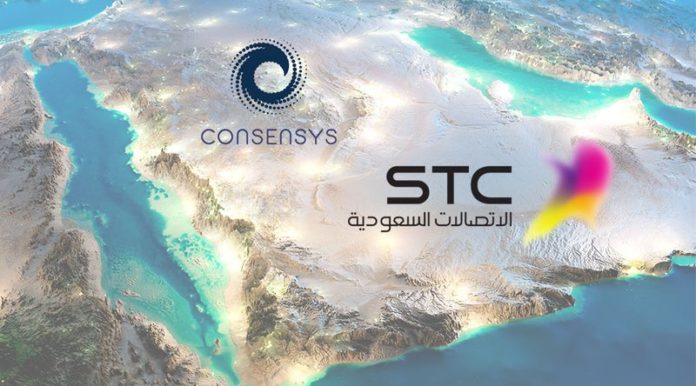
Saudi Arabia is rebuilding its country’s industry and government infrastructure in line with its Vision 2030 commitment to become a world leader in the adoption of blockchain infrastructure technology.
ConsenSys, the world’s largest Ethereum blockchain design studio, is partnering with the Saudi Telecom Company (STC), to help make this happen.
In a Memorandum of Understanding (MOU) signed recently, the two companies agreed to work together to design and build out blockchain technology in a range of government and private sectors including real estate, banking and healthcare.
STC, a telecommunications company offering cell phone, internet and computer services, based in Riyadh, was defined in the MOU as the lead agency for the ongoing digital transformation of the country, and ConsenSys is identified as an enabler of this transformation.
ConsenSys Sets Up Shop in Dubai
ConsenSys, currently headquartered in New York City, is establishing a significant presence in the Middle East, setting up its second largest office in the Dubai Design District in the United Arab Emirates. The ConsenSys Dubai office expects to have 50 employees by the end of 2018.
Lina Hediah, executive director, ConsenSys MENA region, said that blockchain technology is “vital for the future growth (of Saudi Arabia) as it enables efficient, secure and cost-effective ecosystems and facilitates the automation of business systems creating added value.”
Commenting on their new partner, Hediah said STC is “the largest telecom operator in the region, with a large and significant geographic footprint,” so it is well placed to lead the blockchain makeover.
ConsenSys is also the Dubai City Blockchain Advisor, providing design and technical advice as well as regular blockchain training, events and education and engaging the Dubai Design District community through regular meetups.
In an earlier announcement, ConsenSys founder and Ethereum co-founder Joseph Lubin laid out his company’s commitment to growing the Ethereum ecosystem in the Middle East:
“Using blockchain technologies to build next-generation nations has always been high on our agenda, and there is no better place to witness this strategic transformation than Dubai, which is forging ahead with its aim to be the world’s first blockchain-powered city.”
Saudi Telecom Company
STC told Bitcoin Magazine in an interview that the company’s goal is to be a leader in establishing blockchain ecosystems based on “open standards.” Riyadh S. Muawad, vice president of Key Accounts, said:
“STC is always looking to bring in the best-of-breed technology to leverage the global alliances and experiences to enrich innovation. Blockchain platforms are in a rapid evolution phase, whereas Ethereum blockchain technology is based on open standards and has an industry wide adoption.”
Muawad added that STC aims to tailor the blockchain business applications it builds for various industry verticals, helping them to accelerate adoption in a seamless manner. “Presently our focus is on use cases which are more relevant for blockchain applications, employing the core principle of a ‘trusted distributed ledger.’”
ConsenSys Wants to Build More Than Just Blockchain Technology
“This partnership not only marks Consensys’ official entry into the Kingdom but is evidence of our commitment to helping build next-generation nations using blockchain technologies,” said Hediah.
“Our experience in building bespoke applications showcases qualitative capabilities, and by leveraging STC’s reach we are looking to really immerse ourselves in the Kingdom’s transformation agenda making a significant impact on both the economic and social infrastructure.”
As outlined here, the ConsenSys Social Impact team is “spearheading research on blockchain solutions for sustainable development in emerging economies.”
In addition to building social infrastructure in emerging economies, ConsenSys is working with developing nations on energy sustainability projects like Grid+1, creating a distributed electricity provider with registration and payments built on the Ethereum blockchain.
This article originally appeared on Bitcoin Magazine.

Bitcoinmagazine.com is author of this content, TheBitcoinNews.com is is not responsible for the content of external sites.
Our Social Networks: Facebook Instagram Pinterest Reddit Telegram Twitter Youtube










